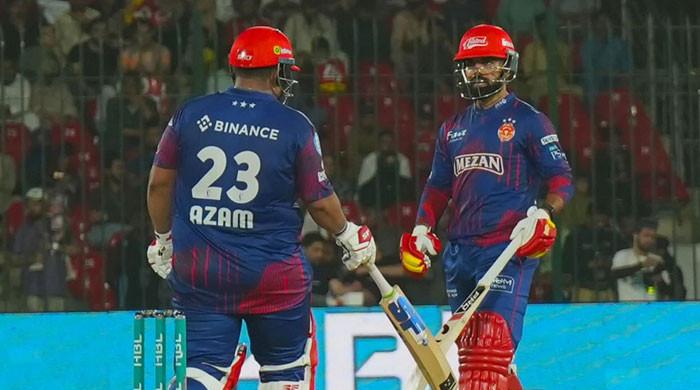Ramiz Raja shifts responsibility for condition of home pitches to Babar Azam
"I was only listening to Babar," former chairman of PCB says in regards of home ground pitches for Australia series
October 20, 2024

Former Pakistan Cricket Board (PCB) chairman Ramiz Raja has shifted responsibility for Pakistan's underwhelming home pitches during his tenure to the then-captain Babar Azam, despite previously defending the surface conditions.
Raja, speaking during a BBC Test Match Special (TMS) broadcast during the second Test between Pakistan and England in Multan, said Babar had been integral in pitch-related decisions, a significant shift from Raja's earlier public comments where he defended the state of the pitches as part of a broader strategy against Australia in 2022.
In his interview, Raja pointed to Babar as the central figure in setting up the pitch strategy during Pakistan's series against Australia. "I wasn’t really bossing the pitch preparation," Raja said.
"I was only listening to Babar. When he’d walk into my room, I’d ask him what plans he had to beat Australia. He came up with the strategy, and even though I sometimes questioned it, he was the captain at the end of the day," he added.
“It becomes a guessing game when you do not know the nature of a pitch. You can't really plan for an assault if the pitch is not going to behave properly or to your liking and to your strength. And that's been the major reason, a major cause for Pakistan's debacle at home. The pitches have not really responded to the kind of talent that you picked to perform,” Ramiz said.
These remarks suggest a change in position from Raja, who, as PCB chairman, was widely seen as the primary authority behind the decisions that led to Pakistan's pitches receiving international criticism for being too flat and lifeless, particularly during the first Test against Australia in Rawalpindi. The match ended in a high-scoring draw, with only 14 wickets falling across five days.
Australia’s Steve Smith had, then, termed the wicket “dead and benign” during one of the interactions with media.
However, Raja had defended the pitch strategy, claiming that it was designed to protect Pakistan’s limited resources against Australia’s powerful bowling attack.
"A drawn match is never a good advertisement for Test cricket, and I totally understand that we need to get a result in five days," Raja had said after the Rawalpindi Test in March 2022.
"But just for the heck of it, we can’t prepare a fast pitch or a bouncy pitch and put the game in Australia’s lap," he had added.
During his appearance at BBC TMS broadcast, Ramiz Raja also shared his assessment of Babar captaincy.
While praising Babar for his leadership in white-ball cricket, Raja expressed frustration with his Test captaincy.
"Partly, I rated him," Raja said. "He did well in white-ball cricket, but not so much in Tests. I was frustrated at times with how he set the field and managed things."
However, Raja acknowledged Babar's ability to keep the dressing room calm during turbulent times.
"One great thing about Babar Azam was that he held the calm of the dressing room together. They all responded to him when he had the backing of the board," Raja added.
Raja also touched on the importance of players like Babar and Shaheen Shah Afridi for the branding of Pakistan cricket. "They are the advertisements," Raja said.
"When you're flipping through cricket channels, why would you stop for Pakistan cricket? Maybe to watch Babar Azam’s cover drive or Shaheen Afridi’s in-dipping yorkers. Remove them, and from a sponsor’s or fan’s perspective, it doesn’t look great."











